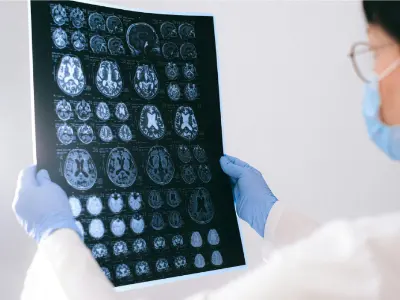

These are important times in Alzheimer’s disease (AD) research and treatment. Thanks to the steady evolution of science, researchers and drug developers are now poised to take on the challenges of a devastating disease that robs patients and their loved ones of precious time and memories.
We’re on the cusp of the most significant breakthroughs to date in solving the major treatment obstacles that AD has posed for decades. For the first time, the U.S. Food and Drug Administration (FDA) has approved treatment options that show a modest ability to slow the pace of memory and thinking problems for people with very mild disease. That’s encouraging news for the nearly seven million Americans living with the disease, a number that is expected to rise to nearly 13 million people by 2050.1
There is more to come. Continued progress in AD research is pointing the way to potential new treatments that can do more than slow cognitive decline but also alter its course: a day that people with AD and their families have long and urgently hoped for.
Why This Moment in Alzheimer’s Disease Research is Different
Until 2023, FDA-approved AD treatments were limited and only addressed symptoms. While the new drugs reflect great scientific progress, they are only the right fit for a small slice of the population on the AD trajectory.
Today, there are clinical trials underway that were improbable even a decade ago. For instance, take thiamine (or vitamin B1), a nutrient with extraordinary potential. Thiamine is vital to brain function and the glucose system, and a lack of thiamine compromises memory and cognition. In fact, the brain tissue of people with AD shows a marked thiamine deficiency, despite sufficient levels of thiamine in a person’s blood.
Scientists believe that boosting thiamine levels to as much as 100 times the normal amount in the body could be the secret to slowing the progression of AD, and that it could work in combination with other existing treatments to offer additional benefits beyond what current therapies can achieve. A new clinical trial called BenfoTeam, funded by the National Institute on Aging (NIA), part of the National Institutes of Health (NIH), is seeking to shed light on this potential connection. This trial builds on scientific research regarding thiamine deficiency and treatment with high levels of thiamine and will focus on benfotiamine, a synthetic form of thiamine that holds the promise of slowing down memory and thinking problems caused by AD.
Benfotiamine is a therapeutic drug that raises blood thiamine (vitamin B1) levels very high. BenfoTeam physicians and researchers think high levels of vitamin B1 in the blood may improve problems with brain glucose utilization in people with mild cognitive impairment (MCI) and mild AD. Benfotiamine is safe and has the potential to improve cognitive outcomes among people living with MCI and mild AD.
The BenfoTeam trial is a fresh, new approach to fighting AD, with the potential to offer an accessible and cost-effective treatment for people living with the disease.
Participation by People with Early-Stage Alzheimer’s Disease
Alzheimer’s disease often begins silently, long before memory loss becomes noticeable to a person and their loved ones. By the time most people receive a diagnosis of AD, significant brain changes have already occurred. This is one of the many reasons that clinical trials for people with early AD or mild cognitive impairment (MCI) are so crucial.
BenfoTeam physicians and researchers are calling for people with MCI or early AD to participate in this study, which will be taking place in clinical trial sites across the U.S. This study will last for up to 18 months, plus screening, and is designed for people aged 50-89 years and diagnosed with AD and/or are experiencing mild memory concerns.
The BenfoTeam trial needs people of every race and ethnicity to participate in the study to help find a treatment for AD that works for all. It is essential for clinical trials to reflect the broad demographics of the U.S. population and include people from all walks of life.
Alzheimer’s is a harrowing disease, exerting the pain and suffering of inevitable decline on millions of patients and their families. But thanks to scientific innovation and the determined efforts of the brightest minds in the research and drug development communities, AD treatments are turning the corner. As the road ahead in AD evolves and new directions take shape, efforts like the BenfoTeam trial represent a step forward from which new possibilities in treating AD can break through.
There are many different clinical trial options for people with MCI or mild AD. There are designated specialists at the NIH/NIA available by phone and email, who can help identify research opportunities close to you. The NIA's Alzheimer's education and referral service specialists can be reached at 800-438-4380 (9AM to 5 PM eastern) or email adear@nia.nih.gov.There is also an online clinical trial matching service that provide information about trials searchable by geographic area and diagnosis.
To learn more about the study, visit BenfoTeam.org.
About Gary E Gibson, Ph.D., Professor of Neuroscience, Weill Cornell Medicine/Burke Neurological Institute
Dr. Gary E. Gibson received his B.S. degree in Zoology and Chemistry from the University of Wyoming. He received his Ph.D. in Physiology with emphasis in Biochemistry and Neuroscience at Cornell University. He did his postdoctoral work at UCLA and was on the faculty at UCLA. He then moved to Cornell University Medical College and Burke Medical Research Institute, where he has been ever since. He is currently Professor at the Brain Mind Research Institute at Weill Cornell Medical College (with tenure), and is also a member of the Institute's graduate program and teaches graduate students in that program. He also served as the Associate Director of the Dementia Research Service.
References:







Comments
Post a Comment